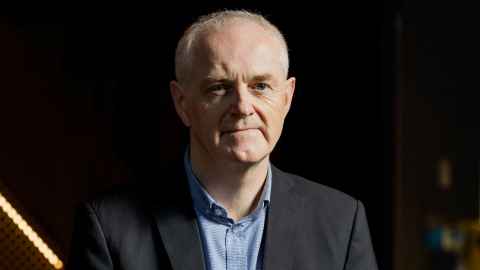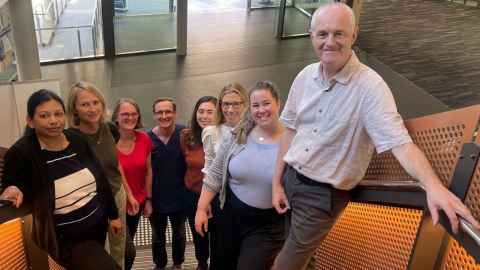New gene therapy trial for muscular dystrophy
27 August 2025
A groundbreaking genetic treatment for a rare form of muscular dystrophy is being trialled at the University of Auckland’s Centre for Brain Research.

The first clinical trial of a new treatment for a rare form of muscular dystrophy is being led by the University of Auckland’s Centre for Brain Research
The researchers hope the therapy being tested might cure facioscapulohumeral muscular dystrophy.
Currently, there is no treatment available that changes the course of the genetic condition, which leads to facial paralysis, difficulty with raising the arms above the head and, for some people, the need to use a wheelchair.
Nine patients in New Zealand, America and Australia will be receiving the CRISPR therapy, which targets the faulty DUX4 gene responsible for the condition.
“In healthy people, muscle cells do all they can to turn off DUX4 production; however, in people with facioscapulohumeral muscular dystrophy, genetic changes allow DUX4 production to escape this suppression,” says Centre for Brain Research neurologist Associate Professor Richard Roxburgh
The cutting-edge therapy – scientific name EPI-321 – uses a process called epigenetic editing, which provides genes with permanent instructions to change the way they behave.
The therapy is delivered through a common virus, which about a fifth of the New Zealand population has had without knowing, because it causes no symptoms.
This virus has been modified to carry the instructions to suppress DUX 4 production.
Harnessing the virus means a single injection can get to hundreds of billions of muscle cells in the body.
Participating in the study is not without risk. Safety studies have been done in animal models and these suggest EPI-321 is safe, “but we don’t know how people will react until it’s actually tried in humans,” says Roxburgh.
The injection gives a far higher dose of the virus than people would typically get and this could potentially cause serious reactions from the body’s immune system, says Roxburgh.
Participants will be monitored over a period of five years for side effects and signs of improvement.
“People stepping up for the study are aware of this risk and are pioneers – like first explorers or astronauts going into the unknown,” he says.
The study is one of two international facioscapulohumeral muscular dystrophy trials currently being led by the Centre for Brain Research. Another trial testing a different genetic approach began last year and is showing promising results.
Miriam Rodrigues, who is involved in recruiting participants, says it is an exciting time.
“Advances in genetic research and technology are showing real promise for diseases like facioscapulohumeral muscular dystrophy, but robust clinical trials are essential to assess how well these new therapies work.
“New Zealand is an ideal location for clinical trials. We have world-class researchers, a high-quality healthcare system, and a motivated patient community. Yet, there are still too few opportunities for New Zealanders to participate in leading-edge trials like this one.”
The study is led by Roxburgh in collaboration with the Pacific Clinical Research Network, a private clinical trials company.

Kiwi patient joins drug trial for muscular dystrophy
Sarita* is the first person in New Zealand taking part in the gene therapy trial.
When she was diagnosed two years ago, Sarita was told there was no cure, and doctors could do nothing to slow the disease.
Now, she’s one of nine people worldwide taking part in a gene therapy trial that she hopes will stop the condition in its tracks.
“It’s given me hope — I didn’t have any hope two years ago,” she says.
Sarita was active and healthy until her late 50s, when she noticed changes in her muscle strength and movement, such as struggling to stand on tiptoes or walk up hills.
"It was like my brain was trying to tell my muscles to move and the message was getting blocked along the way."
After numerous tests, she was diagnosed with facioscapulohumeral muscular dystrophy (FSHD), a rare condition affecting about 130 people in New Zealand.
Over the past two years, her mobility has slowly declined and she now faces the prospect of losing her job and her ability to walk.
"It’s like you’re a ticking time bomb and you don’t know when the alarms are going to go off in your body - that’s a really unsettling way to live.
"If I’m not given something soon, I will lose my independence. I suppose that’s what I see this trial as — potentially giving me hope of keeping my independence."
Despite the risks of an experimental treatment, she didn’t hesitate when offered a place in the drug trial.
“When you’re told there’s no cure and someone offers you a chance, you take it. Even if it means a small improvement, like walking a bit better. And if it doesn’t work, it is what it is — but at least you gave it a go.
"Suddenly I have an ability to do something for a disease that I have no power over whatsoever, and that’s a wonderful feeling," she says.
*Her real name has not been used.
Media contact
Rose Davis | Research communications adviser
M: 027 568 2715
E: rose.davis@auckland.ac.nz